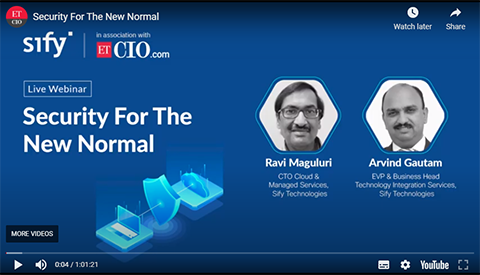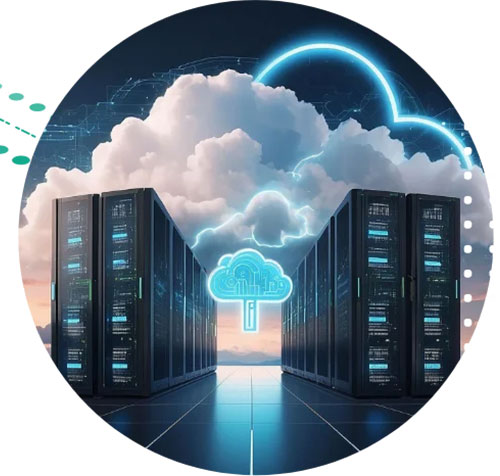What is Network Security? Definition, How It Works & Best Practices
As businesses continue to embrace digital transformation, cyber threats are escalating at an alarming rate. Today, organizations rely heavily on the Internet for communication, business transactions, and managing sensitive information.
Data center service providers in India: Empowering growth through robust connectivity and security solutions
Companies today increasingly recognize the importance of partnering with reliable data center service providers to augment their operational efficiency and security.
Security For The New Normal
SPEAKERS:
Ravi Maguluri, CTO Cloud & Managed Services, Sify Technologies
Arvind Gautam, EVP & Business Head Technology Integration Services, Sify Technologies
DATE:
November 20, 2020 | 6.00 PM
DESCRIPTION:
Globally, the pandemic has created challenges for businesses and enterprises are struggling to efficiently operate in an altered world. As a result, there is a sudden increase in digital technology adoption, and enterprises are forced to shift their workloads to the cloud. Enterprises are apprehensive about the overall security associated with the cloud.
Understanding the gravity of a secure workplace to drive a secure future, ETCIO in association with Sify is hosting a webinar titled “Security For The New Normal”. Gain the best practices from the industry experts on security and privacy challenges relevant to cloud computing.
Key Takeaways
- Understanding the new threat landscape and designing a detailed strategic roadmap
- Data-centric view of business while migrating to the cloud
- Building a robust Cloud Security Posture for an effective security framework
- Analyzing comprehensive and proven Cloud Access Security
- Identifying security and risk management roles and responsibilities
- Cloud Workload Protection: Better control over assets and build enhanced cloud security and resiliency
Breaking barriers to market entry through robust and secure IaaS
Comprehensive, carrier-neutral data center and cloud connectivity solutions help US-based cloud contact center company build footprint in India
Project Objective
To build the first point of presence in India and help the customer to provide services in the Indian market, by providing colocation services at Noida.
Project Model
Infrastructure as a Service (Iaas) Model
Sify’s Uniqueness
- Sify’s value proposition and competitive pricing.
- Connectivity to cloud, carrier-neutral facility and 24×7 onsite support
- One-stop-shop solution for customer needs
Integrated Value and Outcome
- Data center services and connectivity to cloud at Sify’s Noida facility to achieve cloud adjacency
- Sify’s unique value proposition and ecosystem helped customer to take the right decisions.
- Sify provided secure and reliable infrastructure, timely procurement of equipment as per client requirement.
- The project was completed within given timelines and helped customer to start their operations in India.
Value for Client
Sify provided secure infrastructure, followed the client’s global standard of implementation as per the scope shared, and achieving it within the timeline provided. This has further incurred trust and the client has further planned for its expansion in same facility.
What Are the Trending Research Areas in Cloud Computing Security?
Cloud computing is one of the hottest trends. Most technological solutions are now on cloud and the ones remaining are vying to be on cloud. Due to its exceptional benefits, it has magnetized the IT leaders and entrepreneurs at all levels.
What is Cloud Computing?
Cloud Computing is when many computers are linked through a real-time communication network. It basically refers to a network of remote servers that are hosted in Data Center, which further can be accessed via internet from any browser. Hence, it becomes easy to store, manage, and process data as compared to a local server or personal computer.
What is Cloud Networking?
The access to the networking resources from a centralized third-party provider using Wide Area Network (WAN) is termed as Cloud Networking. It refers to a concept where the unified cloud resources are accessible for customers and clients. In this concept, not only the cloud resources but also the network can be shared. With Cloud Networking, several management functions ensure that there are lesser devices required to manage the network.
When data began to move to cloud, security became a major debate, but cloud networking and cloud computing security has come a long way with better IAM and other data protection procedures.
Cloud networking and cloud computing security revolves around three things-
- Safeguarding user accounts in the cloud
- Protecting the data in the cloud
- And, then the third aspect is application security.
Trending Research Areas in Cloud Computing Security
Following are the trending research areas in the Cloud Computing Security:
- Virtualization: Cloud computing itself is based on the concept of virtualization. In this process, virtual version of a server, network or storage is created, rather than the real one. Hardware virtualization refers to the virtual machines that can act like a computer with an operating system. Hardware virtualization is of two types: Full Virtualization and Para-Virtualization.
- Encryption: It is the process of protecting data by sending it in some other form. Cloud computing uses advanced encryption algorithms in order to maintain the privacy of your data. Crypto-shedding is another measure in which the keys are deleted when there is no requirement of using the data. There are two types of encryption used in cloud computing security including Fully Homomorphic Encryption and Searchable Encryption.
- Denial of Service: It is a type of attack in which an intruder can make the resources of the users unavailable by disrupting the services of the internet. The intruder makes sure that the system gets overloaded by sundry requests and also blocks the genuine incoming requests. Application layer attack and Distributed DoS attack are some of its types.
- DDoS Attacks: It stands for Distribution Denial of Service. It is a type of Denial of Service attack in which hostile traffic comes from various devices. Hence, it becomes difficult to differentiate between the malicious traffic and the genuine one. Application layer DDoS attack is another type of DDoS attack in which the attacker targets the application layer of the OSI model.
- Cloud Security Dimensions: Software called Cloud Access Security Brokers (CASB) in between the cloud applications and cloud users, monitors all the policies related to cloud security and also enforces the cloud security policies.
- Data Security: The Encryption method is used in protecting and maintaining the privacy of the data because security in the cloud-based services has always been the focal point. Due to some vulnerabilities and loopholes, data might get exposed to the public cloud.
- Data Separation: An important aspect of data separation is the geolocation. Organizations should make sure that the geolocation for data storage must be a trusted one. Geolocation and tenancy are the major factors in data separation.
Cloud is one of the topics with no limit at all. With its help, you can perform any kind of project in order to enhance the performance in speed and magnify the security algorithm so as to prevent the files from being hacked.
Sify allows enterprises to store and process data on a variety of Cloud options, making data-access mechanisms more efficient and reliable.
Ways to Ensure your Data on Cloud is Safe & Secure
https://www.sifytechnologies.com/dc-services/Managing your data on the cloud offers myriad benefits to your business. But like any other technology, cloud computing also has its share of risks involved. When considering a move to the cloud, consumers should get familiar with the potential security risks.
There are a few security and privacy challenges relevant to cloud computing and if you have a clear understanding of them, you can safeguard your data against them. Both you and your cloud service provider have responsibilities that address the potential risks. Here are the things to consider to ensure data security:
- You should implement a tiered protection layer for your data to create a security model that includes a multiple perimeter rings of defense. Different layers of defense will safeguard your data from both, internal and external threats.
- Make sure you manage authorisation process. Create a coherent hierarchy of people or departments that have access to your data on the cloud. Moreover, deploy a program to review access trails. Ask your cloud provider if there are process and functionality that control who has access to the data. Work with a provider that offers a cloud environment that is controlled and managed.
- Secure networks and connections are another imperative when choosing a cloud provider. You must evaluate the type of external network controls offered by the provider to distinguish authorised traffic from the unauthorised one. And you should do the same internally as well.
- Evaluating physical infrastructure and facilities of the cloud provider for security controls is extremely important. The physical infrastructure is managed by the provider and you must get assurance from them regarding security in the facilities. Your service provider must have mandatory security controls on their human resources.
- Authorised personnel and physical security are not the only concerns, you should also ensure that the facility is protected against external and environmental threats. Check with the provider whether or not appropriate facilities are in place to make sure that services will continue in case of equipment failure or environmental threats.
- Scrutinising application security is another important aspect, specifically in SaaS deployments. While the cloud provider has the liability of application security, it is imperative that you know all about the security measures taken.
- Go through the security requirements of the exit process. In the event of the termination of service, the consumer must be provided with a smooth transition of data, without any loss or security breach. Make sure the exit process is properly documented in the contract to provide security during the transaction.
The greatest security concern for any business is to pick the right provider. Keeping your data safe is as much the concern of the provider as it is yours. Therefore, you must ensure that you choose a provider that takes data security as a priority so that your doubts are put to rest.































































